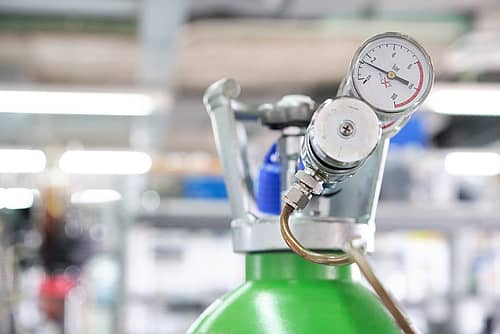NFPA 45 is the National Fire Protection Association’s (NFPA) Standard on Fire Protection for Laboratories Using Chemicals. It provides basic requirements on ventilation, storage and handling of chemicals in lab scale operations. States, cities, and towns can choose to adopt all, or part, of NFPA 45. Some cities and towns in Massachusetts have begun implementing certain provisions of NFPA 45, including the requirements for compressed gas cylinder storage.
Enforcing the requirements of NFPA 45 is in accordance with the current Massachusetts Fire Code 527 CMR 1 (2021 edition) which adopts and incorporates the provisions of NFPA 1, Fire Code. NFPA 1, Chapter 26 states that the handling or storage of chemicals in new laboratories shall comply with NFPA 45, in addition to complying with NFPA 1.
Chapter 10 of NFPA 45 covers compressed gases and liquefied gasses. An important storage distinction is made (10.1.6.3) for gas cylinders that are “in use” in a Laboratory Unit. A Laboratory Unit (or Laboratory Suite), is defined as an enclosed space used for experiments or tests. It consists of laboratories, but it can also consist of non-lab areas, such as offices and other ancillary areas. The Lab Unit is enclosed by walls, partitions, floors and ceilings, including openings in them.
A gas cylinder is considered in use if one of the following conditions are met. The cylinder is:
- Connected through a regulator to deliver gas to a lab operation
- Connected to a manifold being used to deliver gas to a lab operation
- A single cylinder secured alongside an in use cylinder as the reserve cylinder
This means that all other cylinders onsite that don’t meet one of the above conditions are considered “not in use”. In addition, if the cylinder is not consistently in active use, or as stated in NFPA 45 (10.1.2), if the cylinder is not necessary for current laboratory requirements, it should be stored outside of the laboratory unit. In this case, cylinders need to be stored in a separate gas storage room.
Note that NFPA 45 (10.1.4.2) allows a lecture size cylinder of any gas to be kept in a chemical fume hood or other continuously mechanically exhausted enclosure within a laboratory unit.
For additional information on NFPA 45 requirements for gas cylinder storage and how they are being enforced by the local fire department in your city or town, please contact us! For general storage requirements, check out our blog on safe gas cylinder storage practices.
This blog was written by Beth Graham, Director of Quality, Research, and Training with contributions from Rae Moore, Senior Quality, Research, and Training Specialist.


